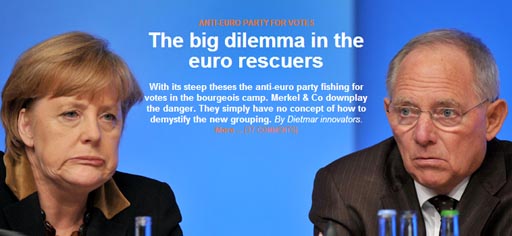The "euro-rescuers" are in a dilemma, says the paper. They do not know how to stop the advent of euro-critics. They have "no convincing answers" to the issues raised by the new party and see them as "pure populism". Instead of dealing with them, therefore, they are mounting "fierce attacks" on the party.
The rhetoric coming from the "rescuers" is eerily familiar. CDU spokesman Steffen Seibert says, "Millions of jobs are secure because we are in this currency as an export country. Whoever endangers that threatens prosperity, jobs and social security". The response to the shortcomings of the eurozone does no justify the exit advocated by AFD, he argues. Rather, they require "solidarity and necessary reforms".
Even more robust is Michael Grosse-Broemer, the chief whip of Merkel's parliamentary party. The yearning for a return to the deutschemark is "dangerous nostalgia", he says, then adding, the sentence "Germany does not need the euro" is fundamentally flawed. Grosse-Broemer argues that despite all the difficulties, Germany could reach its full potential only in a united Europe.
Bavarian Interior Minister Joachim Herrmann (CSU) pours scorn on the AFD, saying that the party is no risk to the government because it had no alternative. "It's a contradiction in itself", he says. It is not offering any real solutions and it is not enough to complain without saying how to do it better".
Former foreign minister Hans-Dietrich Genscher, and a member of the FDP, declares that those in Germany who overtly or covertly work for the end of monetary union "put the great work of unification at risk". He adds: "There is no responsible alternative to Europe".
Nevertheless, the FDP's finance expert Frank Schäffler attributes the enthusiasm for the AFD to the wide popular resentment about the euro debt policy in Europe. "The AFD hits the sore spot for middle class voters and has great success with it", he says, adding that the government coalition had "neglected their core voters with their Euro-destruction policy".
All this and more sounds so much like the British situation that it is uncanny, the earlier parallelsbeing reinforced each day. Not least is the belief that the AFD is most likely to harm Merkel's centre-right coalition and possibly rob it of its majority, letting in the Socialists.
In other respects also, there are uncanny parallels. Like UKIP, the AFP seems to display a certain amount of policy incoherence, being unable to decide whether it wants a complete abolition of the euro, or retrenchment, with the creation of a smaller currency union based on northern European countries.
There is also a great fear, expressed by some, that the party could attract Germany's residual "xenophobic flotsam" – the neo-Nazis - which could make them virtually unelectable.
And Holger Schmieding, chief economist at Berenberg Bank in London, pours cold water on the AFD's ambitions. The party, he says, "is playing to deeply ingrained German fears of inflation and runaway public deficits". But, he says, with inflation at 1.4 percent and Germany's small fiscal surplus, "mobilising these fears is an uphill struggle".
Everhard Holtmann, a political science professor and director of research at the Center for Social Research at the Martin-Luther-University Halle-Wittenberg, is also dismissive of the party's chances. He thinks it is unlikely that it will gain enough votes to secure representation, unless the euro crisis would worsen dramatically in the summer. "Otherwise it would be difficult for the AFD to succeed as a single-issue, protest party".
Holtmann also believes that AFD's attacks on the establishment parties could "lead to expert counter-expertise in the field". A number of prominent economists have publicly expressed the view that there is no alternative to Germany remaining in the euro.
Bernd Lucke, of course, remains unrepentant, claiming that the criticism of his party by Merkel and her allies is motivated simply by self-preservation. Merkel has said that, "if the euro fails, then Europe falls". But Lucke believes that this is not the case. "If the euro fails, it's not Europe that fails, it's Angela Merkel that fails", he counters.
By conventional measures, his launch conference was a success. The mood bordered on the euphoric at times. And the attendees - mainly older men in suits with a sprinkling of middle-aged women - said they were amazed at how much interest the party was generating among friends and family members.
"There is huge potential," said Alexander Gauland, a member of Chancellor Angela Merkel's CDU for 50 years before he defected and signed up with the AFD a month ago. "What has become clear over the past weeks is that there are many people who feel they are not being heard by the big parties, especially when it comes to euro zone bailouts".
Lucke is now sure his party will clear the five percent hurdle necessary for parliamentary representation. He even thinks it realistic to expect ten percent of the vote. But, even if that is the case, it does not guarantee success. The example of the Pirate Party shows that popularity booms can be short-lived in Germany.
Support for that party, which campaigns for Internet freedom, reached a peak of eleven percent a year ago. It now fails to reach the five percent threshold in any of the six regular polls. No other party has been tipped to break the five party system dominated by Merkel's bloc, the SPD, the Greens, the FDP and the anti-capitalist Left Party.
Merkel & Co must be hoping that the AFD's popularity is similarly short-lived. However, Gero Neugebauer, a political scientist at Berlin's Free University, reminds us that - as far as the recieved wisdom goes - the answer to the eurocrisis is political union in Europe. This goes far beyond what we have seen so far, he says. "Merkel wants this union, but the question is if her voters want it too".
If they don't, Bernd Lucke could be on a roll.
COMMENT THREAD
